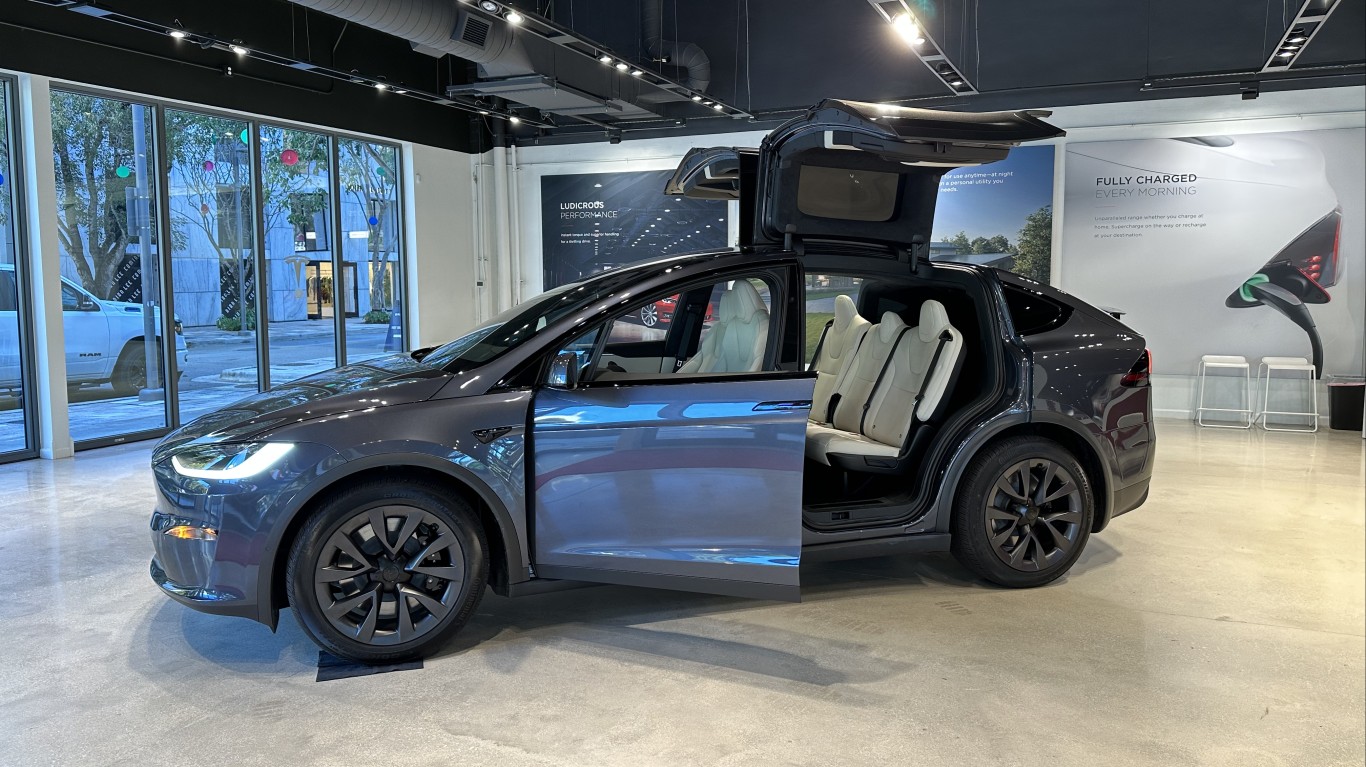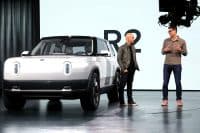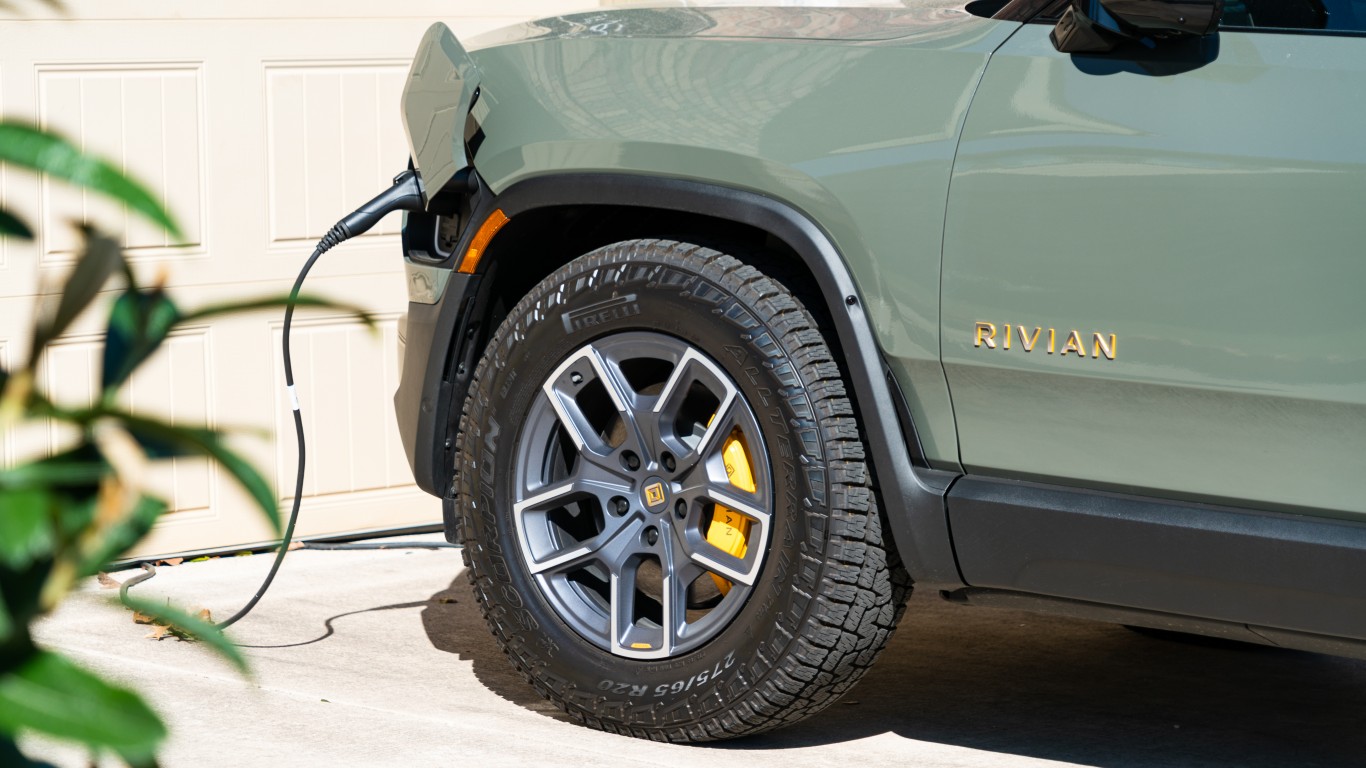
Americans will buy more than one million electric vehicles this year. Prices for battery-powered SUVs, trucks, and sedans has declined nearly 22%, to $51,000, according to Cox Automotive. U.S. EV sales topped 300,000 in the three months ending in September, a staggering 50% increase compared to the third quarter of 2022.
But sales of these zero-emission vehicles aren’t growing as much as the hype around them. General Motors (NYSE: GM), Ford (NYSE: F), and Tesla (NASDAQ: TSLA) recently announced they would postpone investments in these green machines, citing slower-than-expected sales. The companies have committed to investing billions of dollars to retro-fit factories and build new EV and battery-production facilities. These delays have slowed the Biden administration’s efforts to cut U.S. greenhouse gas emissions though generous industrial tax credits.
In September, Ford cited striking UAW workers as a reason it paused construction of a Michigan battery plant, but that might now have been the only reason considering this industry-wide pause. Stellantis (NYSE: STLA), which owns Jeep, Chrysler, and Ram, hasn’t even bothered to introduce an all-electric vehicle in the U.S. market. Sales of electric vehicles in China and Europe are also slowing.
A “bumpy” ride

GM chief executive Mary Barra told analysts during a conference call in October her company is strongly committed to “an all-E.V. future” but that the market is “a bit bumpy,” according to the New York Times. The largest U.S. automaker by sales volume is also delaying the introduction of new EV models, namely the Chevrolet Equinox e-SUV.
Tesla, by far the reigning champion of EV sales, has cut prices to juice sales. The Tesla Model 3 now costs 26% less than last year, to $41,484. That’s below the price of luxury cars from Lexus, Infiniti, and Volvo, according to Cox.
Some of the challenges to scaling up the number of EVs in the U.S. have been around for years. Customers are still concerned with range anxiety – the gnawing concern that a driver could run out of power and get stranded before reaching a charging port. This despite the growing number of public charging stations. (Tesla alone has nearly 2,000 stations and more than 22,000 ports in its U.S. fast-charging “Supercharger” network.)
EVs price premiums
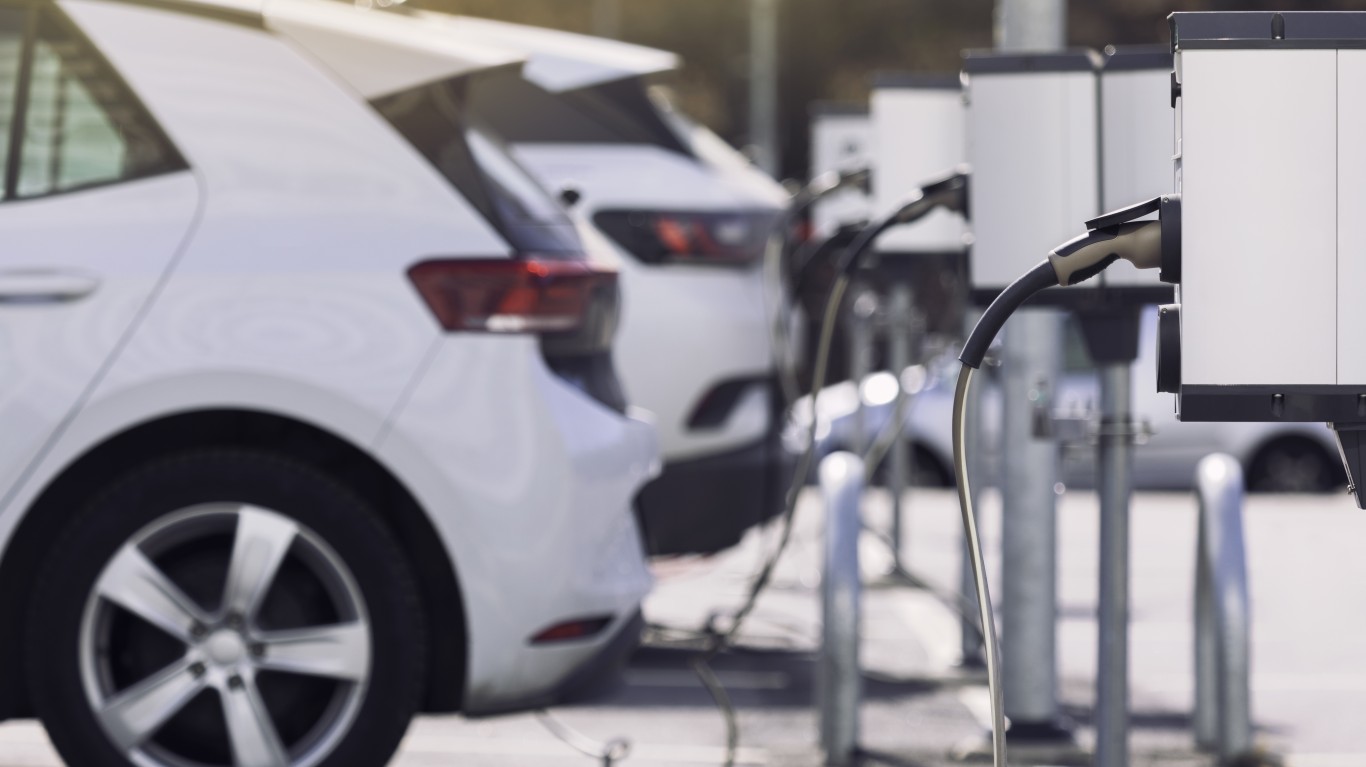
Other challenges to increasing sales is the current high-interest-rate climate. The cost of financing a vehicle purchase is much higher now amid the Fed’s efforts to pull down inflation by making debt more expensive.
And then of course there’s the price. While EV prices are much lower than they have been – spurred mostly by Tesla’s price cuts – they still cost thousands of dollars more on average to drive off a dealer’s lot than a dirtier vehicle.
Overall, U.S. average transaction prices for all new vehicle purchases have skyrocketed. A decade ago, the average price for a new car was around $32,000. Today it’s nearly $48,000, a 50% increase. Cars are more expensive because of the new technologies (including high-tech bells and whistles) that automakers are cramming into them. EVs are still on average a few thousand dollars on top of record-high new-vehicle prices.
More choices than ever

Cox Automotive recorded third quarter U.S. EV sales of 49 models in the US, up from 36 models in the same quarter last year. Twenty sevens brands from all major automakers now have at least one battery electric model. That list includes four automakers that are exclusively focused on electric cars: Tesla, Fisker (NYSE: FSR), Rivian (NASDAQ: RIVN), and VinFast (NASDAQ: VFS).
Tesla sold half of all new EVs purchased in the third quarter. But other automakers are starting to assert themselves in the market. Among manufacturers of internal-combustion-engines, BMW has the highest proportion of EV sales in the U.S. More than 15% of the automaker’s U.S. sales were for its electric cars in the third quarter. Four other brands attributed more than 10% of their third-quarter sales to their electric cars: Porsche, Mercedes, VW, Volvo, and Audi. Hyundai, Mercedes, and Nissan have more than tripled EV sales over the past year – albeit starting from very low volumes. Popular EV brands that aren’t produced by Tesla include the Hyundai Ioniq, the KIA EV6, the Ford Mustang Mach-E, the Chevy Bolt, and the VW ID.4.
Here are the 25 best selling EVs in the U.S. so far this year, listed by lowest-to-highest number of deliveries. Sales data is provided by Kelley Blue Book (Cox Automotive). Some models were introduced for 2023 and lack sales data for the first nine months of 2022. U.S. consumers purchased about 873,000 battery-powered vehicles in the first nine months of the year, a 49% increase from the same period last year.
25. Solterra
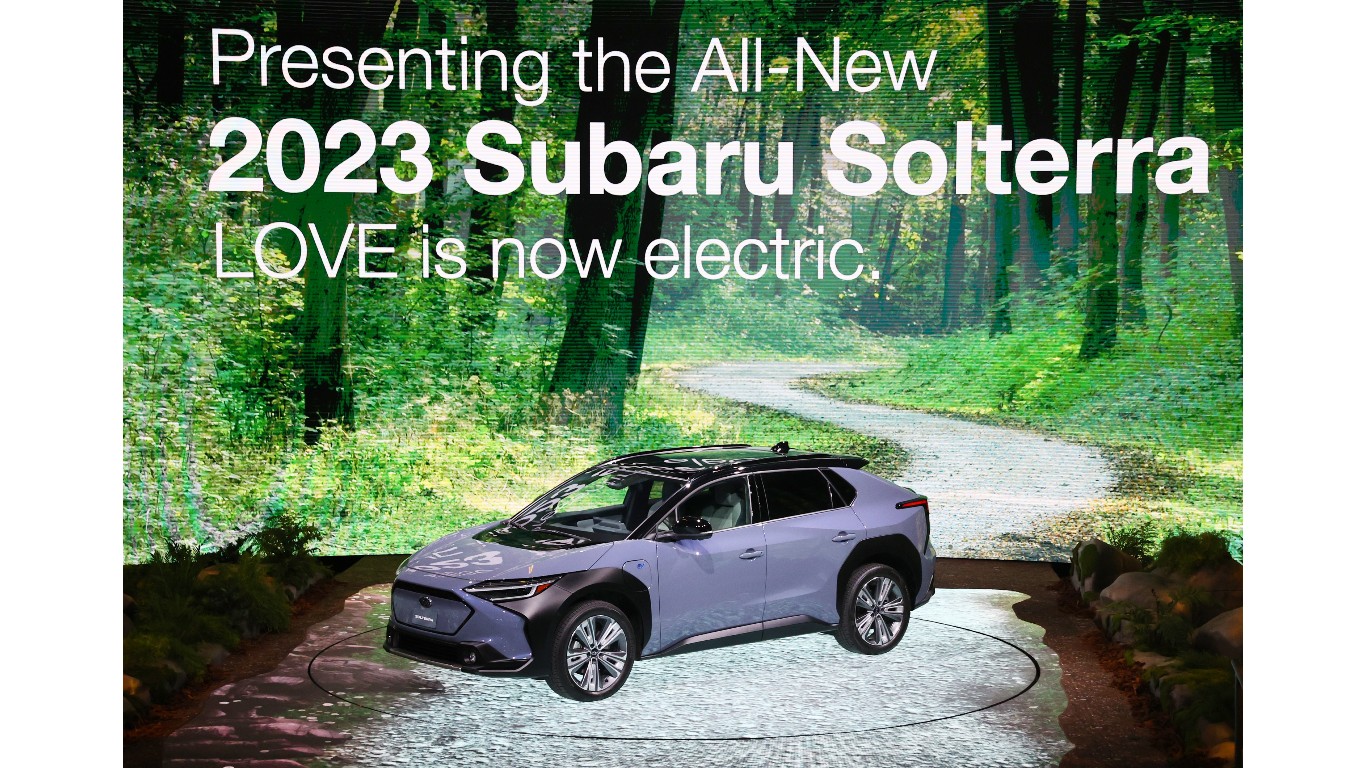
- Automaker: Subaru
- 2023 U.S. sales (first nine months): 5,763
- Share of total U.S. EV sales: 0.7%
- Net change from same period last year: n/a
24. Leaf

- Automaker: Nissan
- 2023 U.S. sales (first nine months): 5,804
- Share of total U.S. EV sales: 0.7%
- Net change from same period last year: -34.8%
23. BZ4X
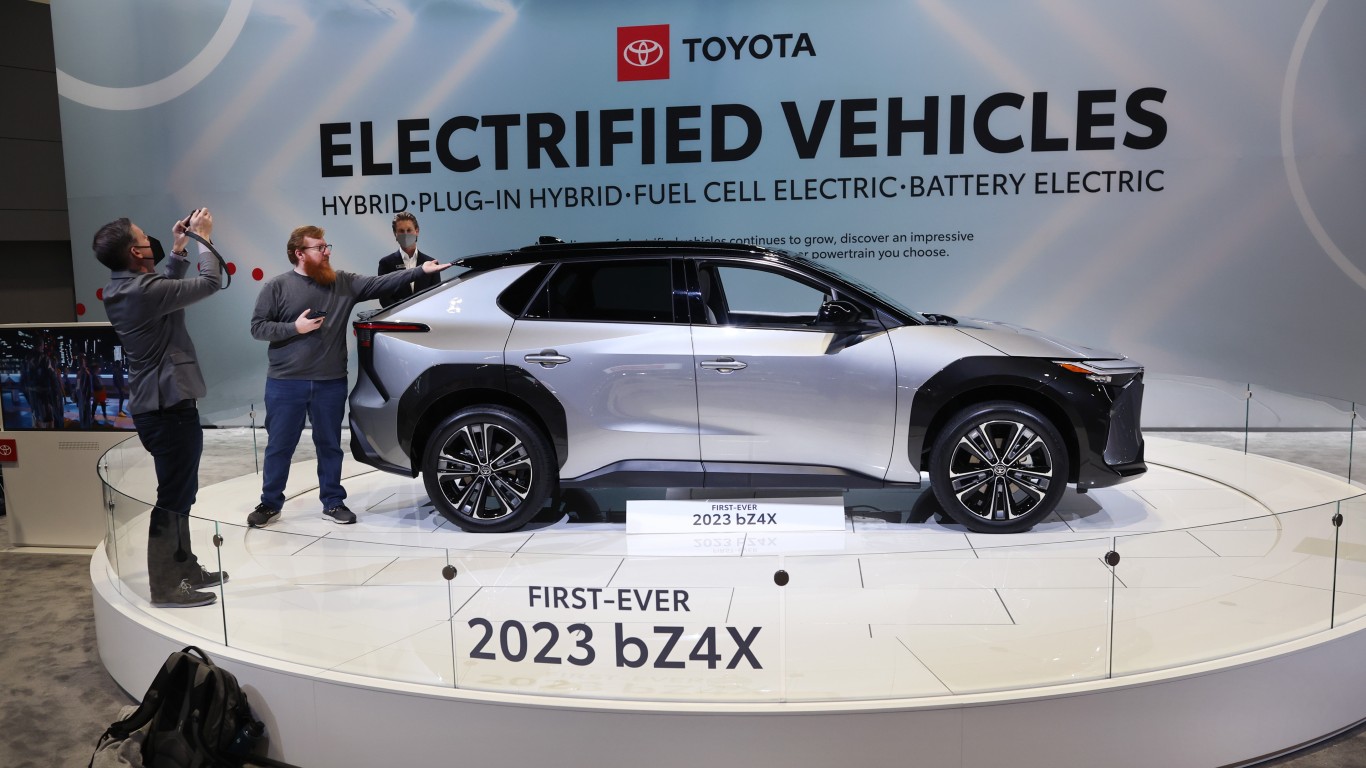
- Automaker: Toyota
- 2023 U.S. sales (first nine months): 6,486
- Share of total U.S. EV sales: 0.7%
- Net change from same period last year: n/a
22. EQB

- Automaker: Mercedes
- 2023 U.S. sales (first nine months): 6,674
- Share of total U.S. EV sales: 0.8%
- Net change from same period last year: n/a
21. C40
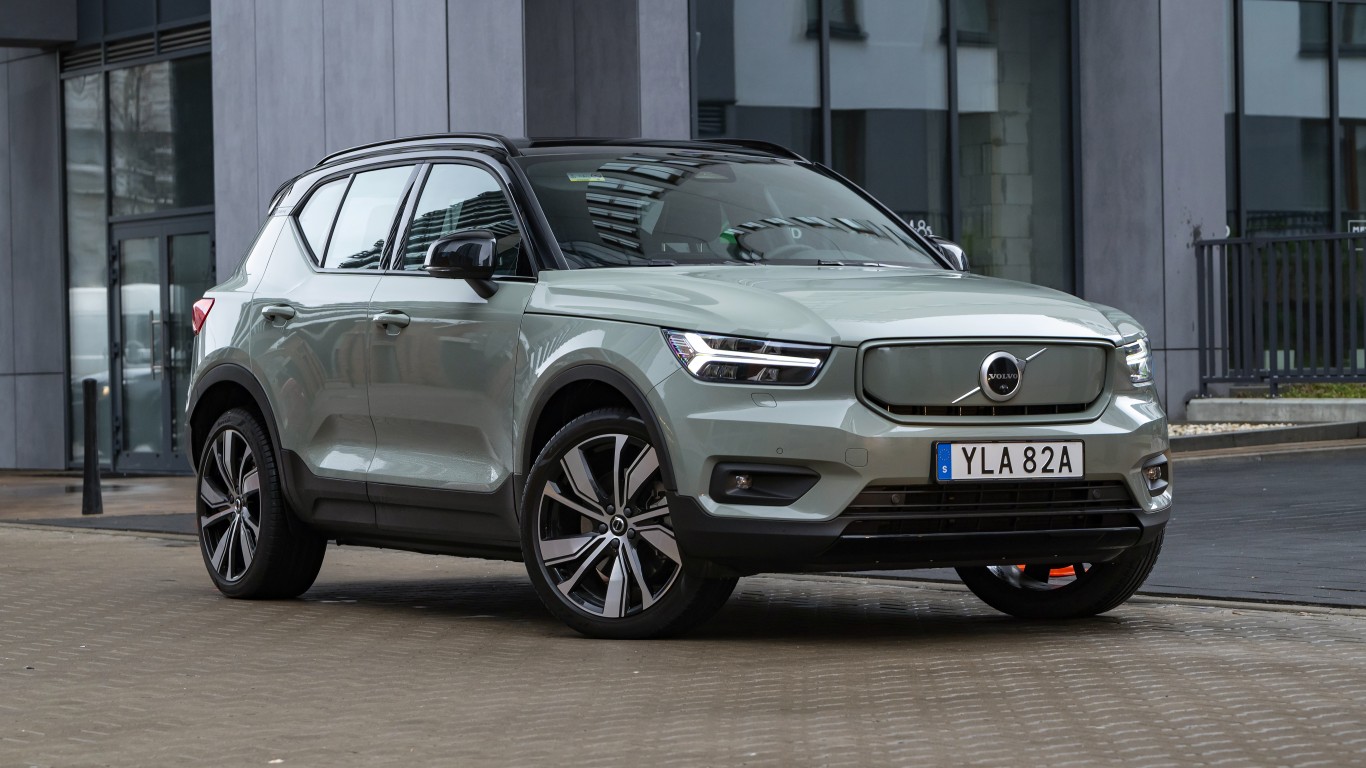
- Automaker: Volvo
- 2023 U.S. sales (first nine months): 6,835
- Share of total U.S. EV sales: 0.8%
- Net change from same period last year: 183.0%
20. Kona

- Automaker: Hyundai
- 2023 U.S. sales (first nine months): 7,672
- Share of total U.S. EV sales: 0.9%
- Net change from same period last year: 197.6%
19. Q4 e-tron
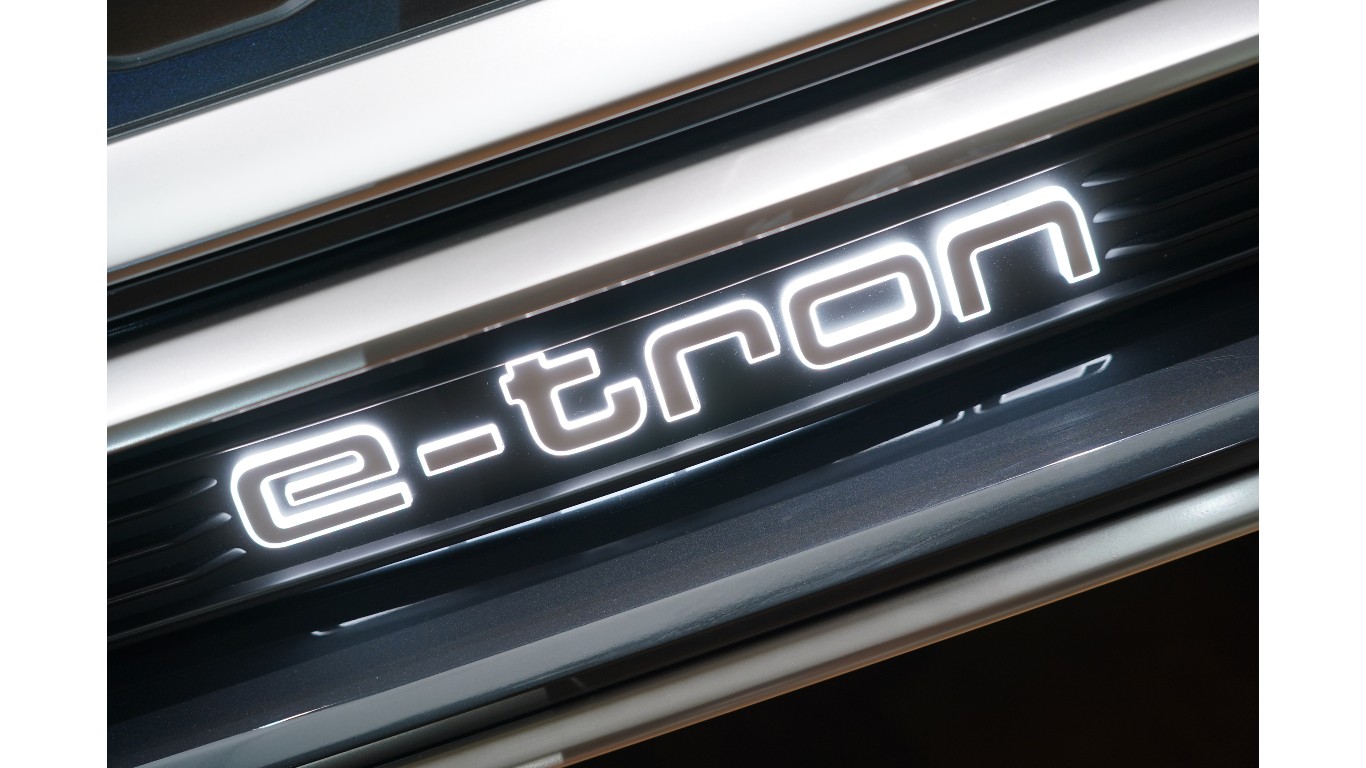
- Automaker: Audi
- 2023 U.S. sales (first nine months): 7,952
- Share of total U.S. EV sales: 0.9%
- Net change from same period last year: n/a
18. Niro
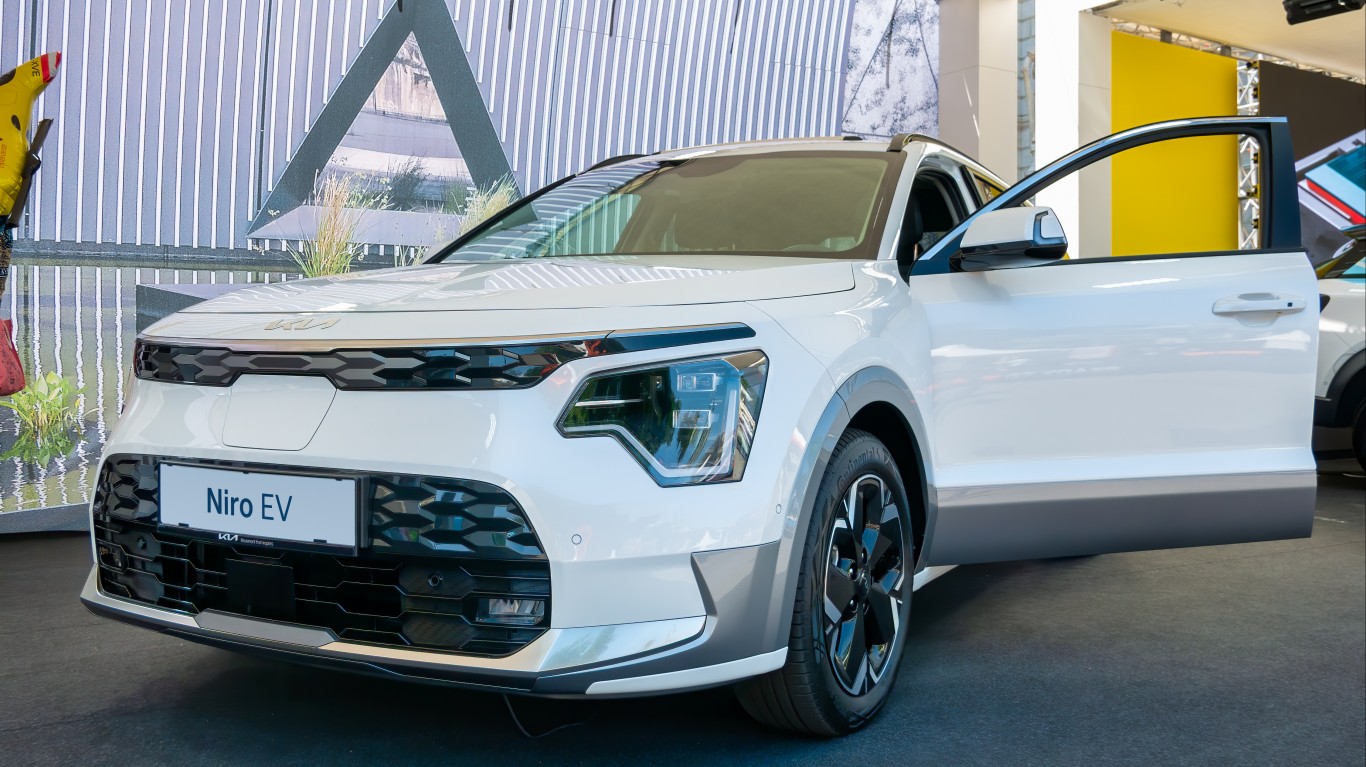
- Automaker: Kia
- 2023 U.S. sales (first nine months): 8,093
- Share of total U.S. EV sales: 0.9%
- Net change from same period last year: 17.2%
17. Ioniq6

- Automaker: Hyundai
- 2023 U.S. sales (first nine months): 8,318
- Share of total U.S. EV sales: 1.0%
- Net change from same period last year: n/a
16. Polestar 2
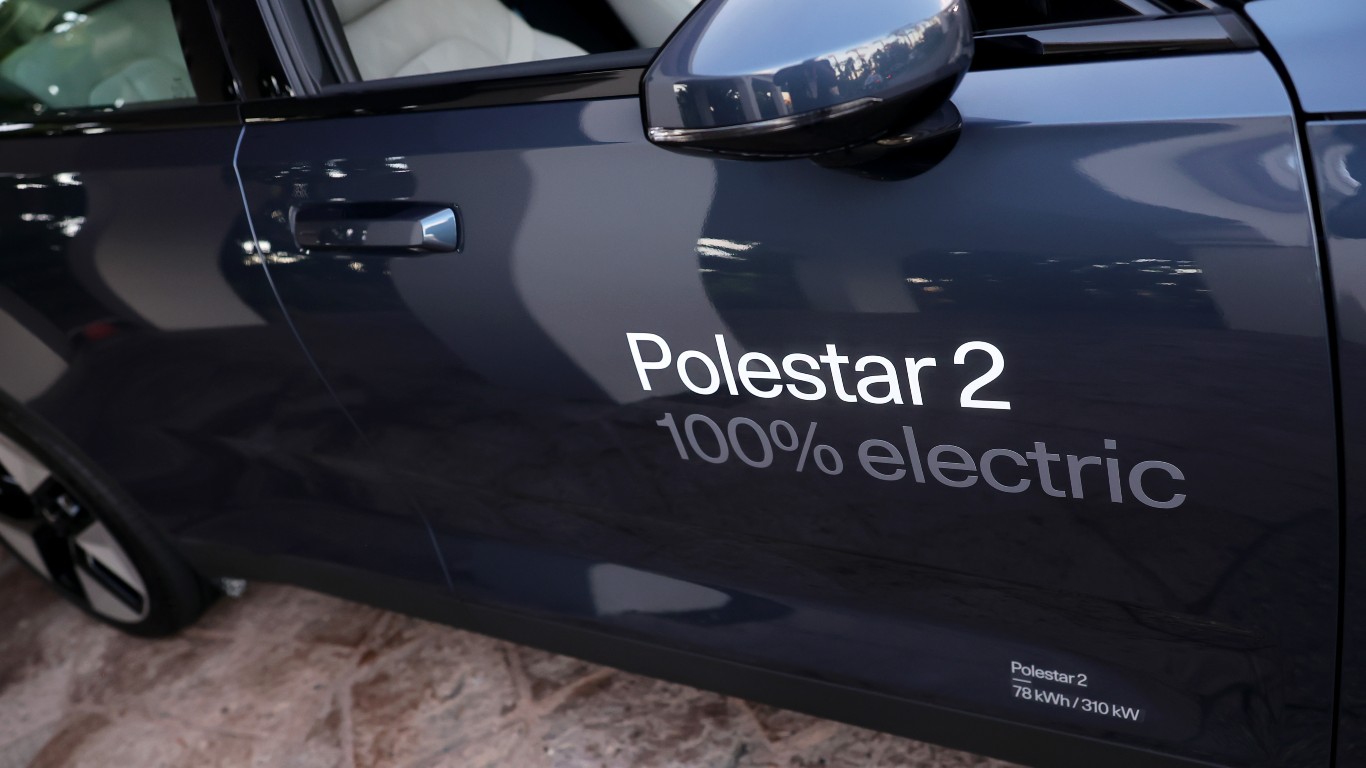
- Automaker: Polestar
- 2023 U.S. sales (first nine months): 8,887
- Share of total U.S. EV sales: 1.0%
- Net change from same period last year: 35.7%
15. Ariya
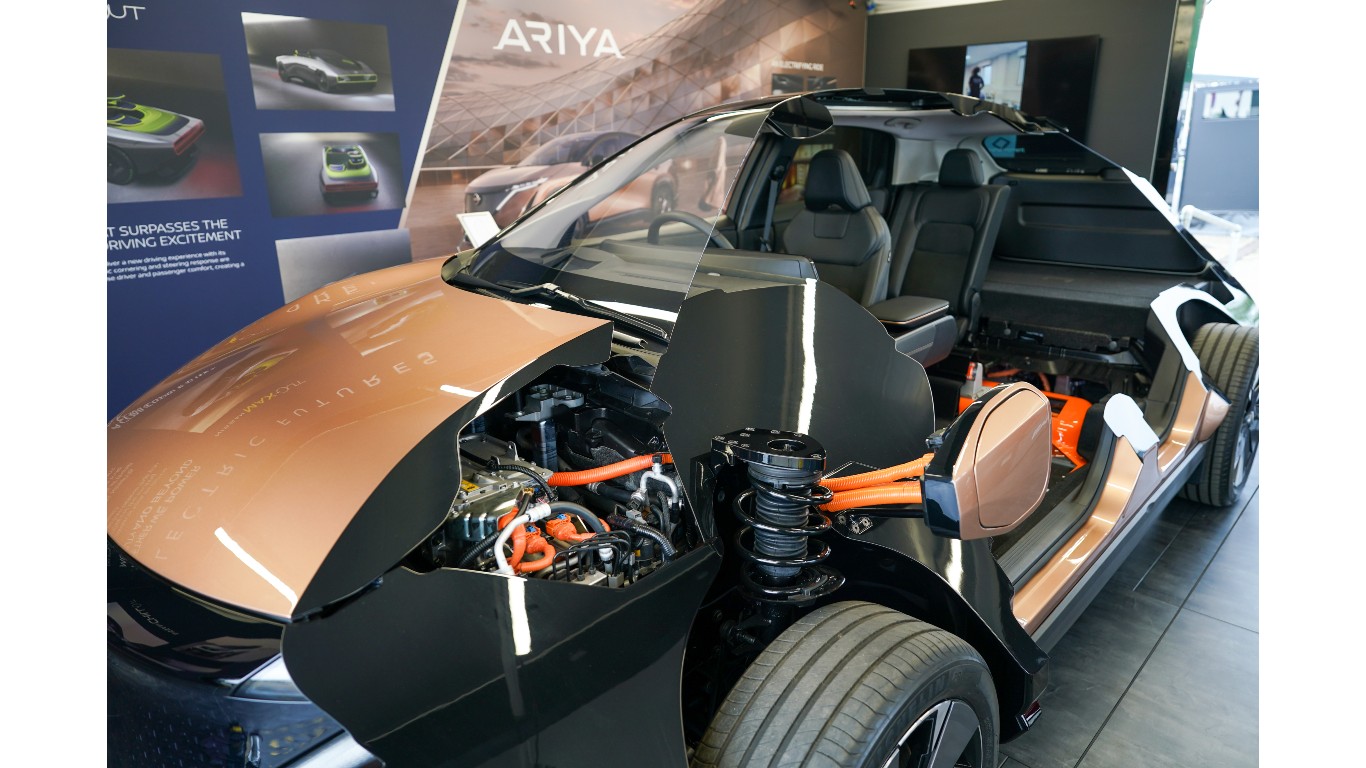
- Automaker: Nissan
- 2023 U.S. sales (first nine months): 9,699
- Share of total U.S. EV sales: 1.1%
- Net change from same period last year: n/a
14. EQS
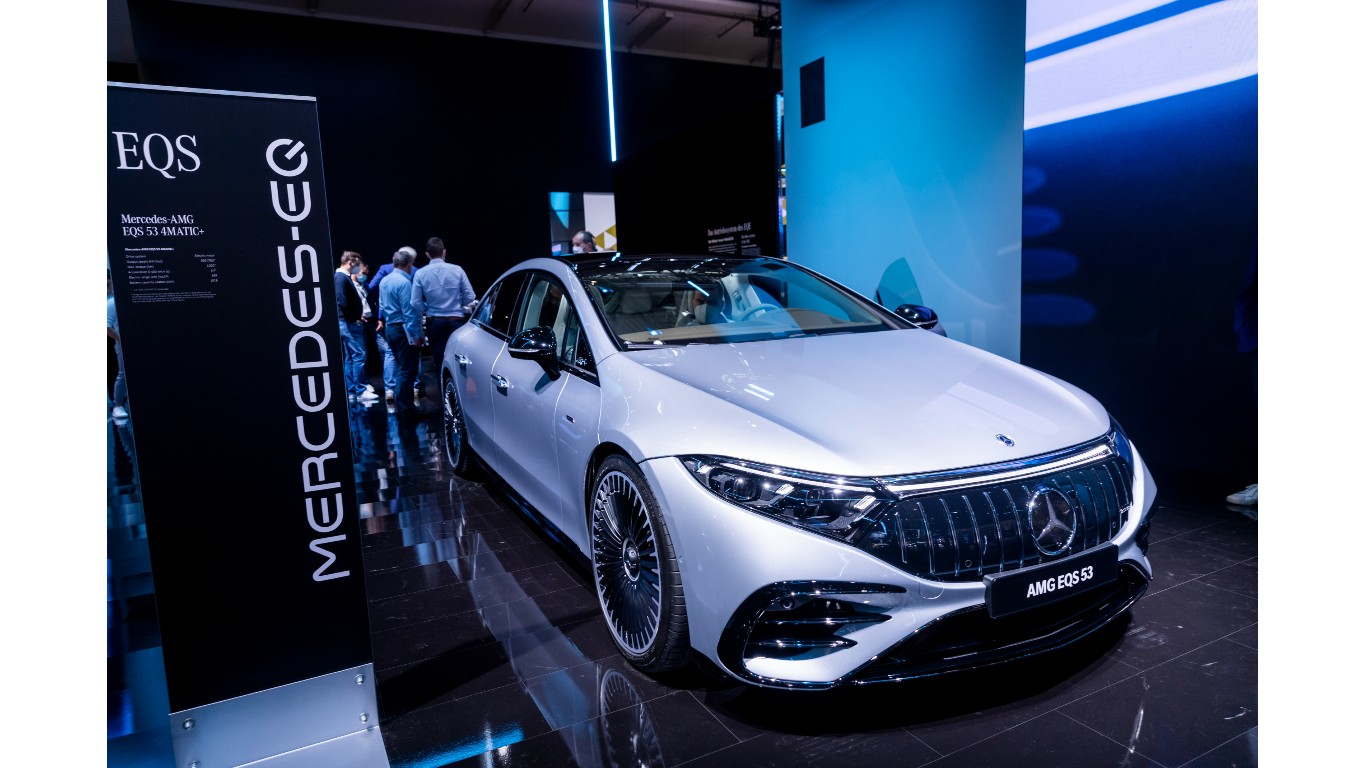
- Automaker: Mercedes
- 2023 U.S. sales (first nine months): 10,292
- Share of total U.S. EV sales: 1.2%
- Net change from same period last year: 111.0%
13. EQE
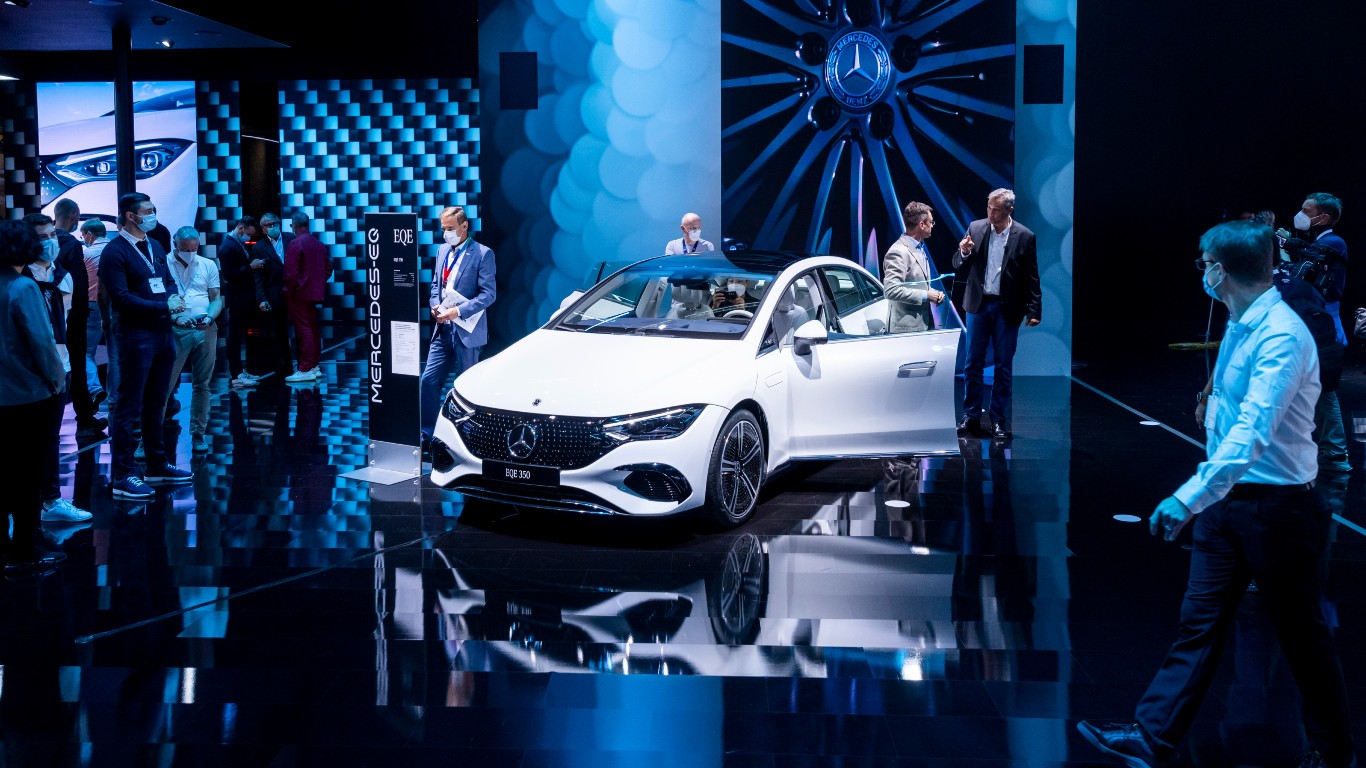
- Automaker: Mercedes
- 2023 U.S. sales (first nine months): 10,292
- Share of total U.S. EV sales: 1.2%
- Net change from same period last year: n/a
12. iX
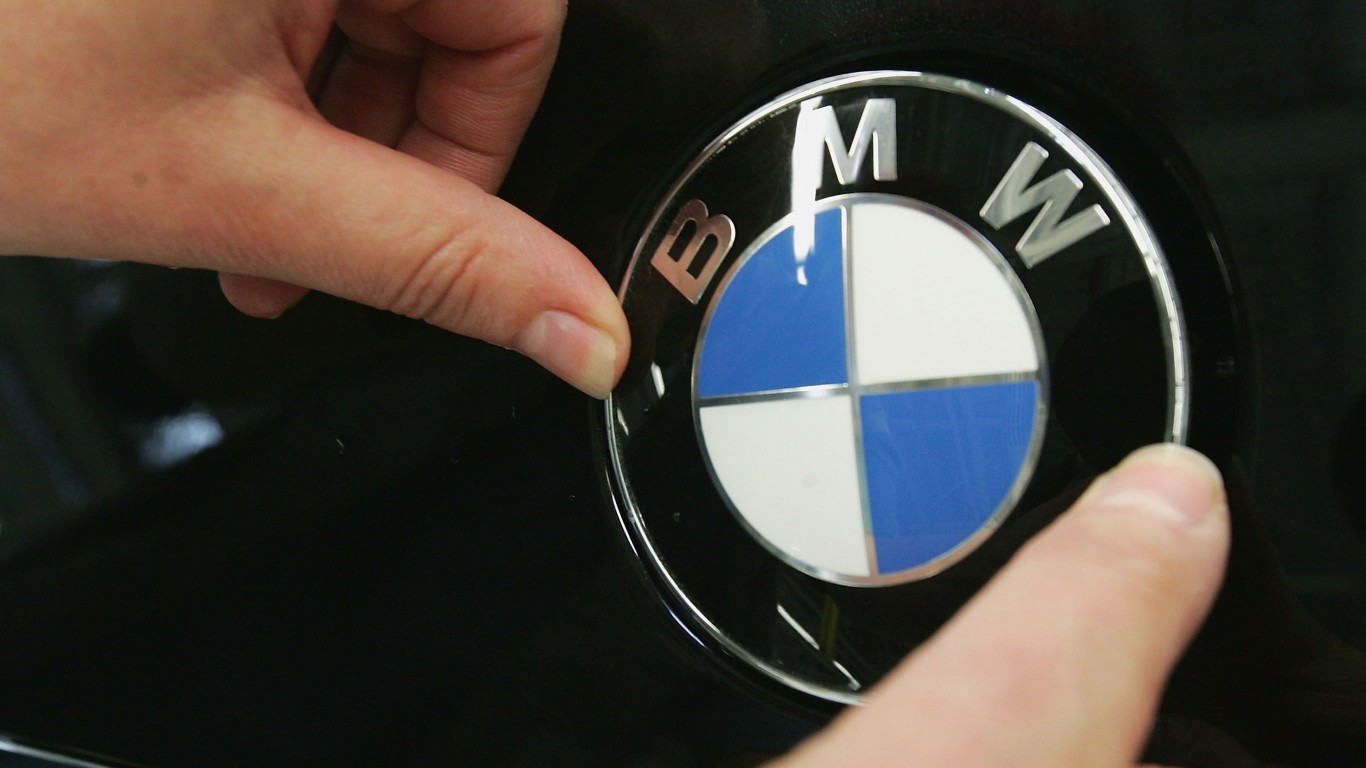
- Automaker: BMW
- 2023 U.S. sales (first nine months): 12,027
- Share of total U.S. EV sales: 1.4%
- Net change from same period last year: 281.2%
11. F-150 Lightning
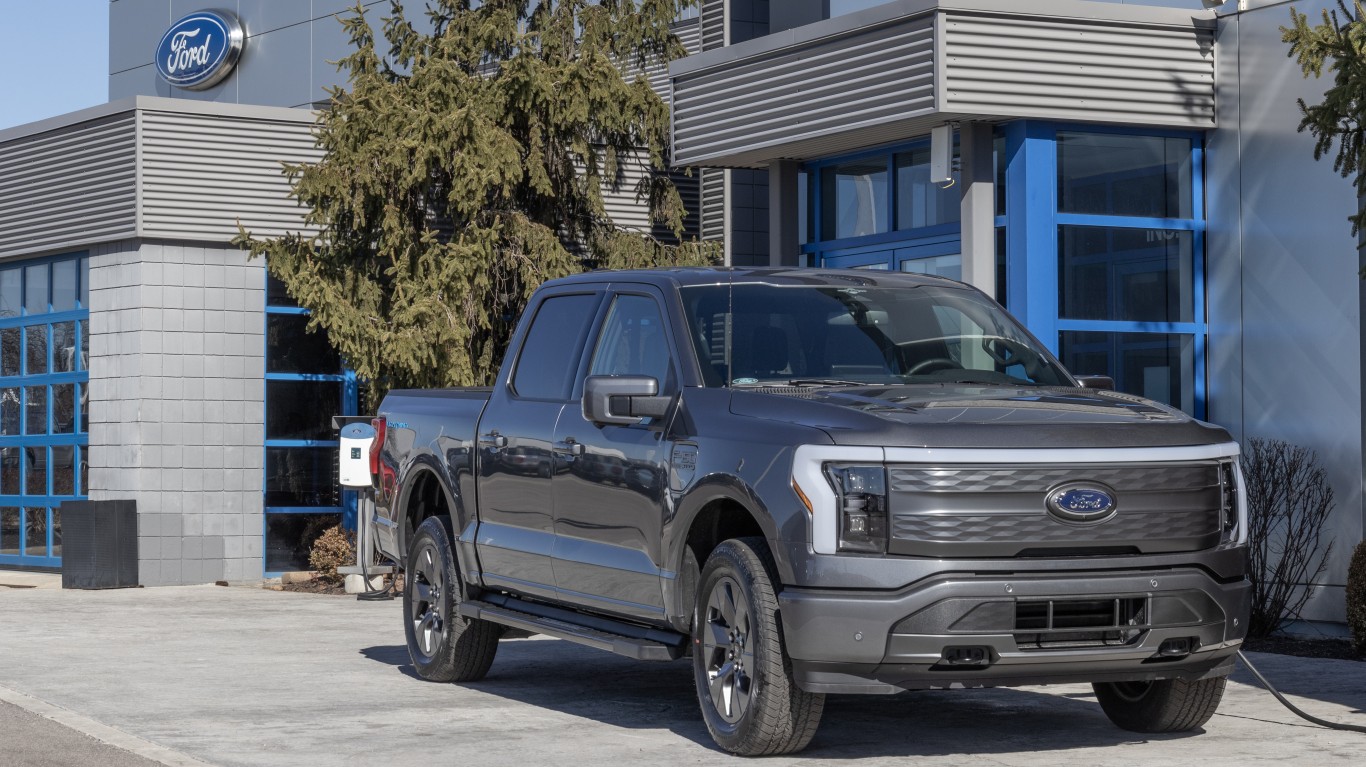
- Automaker: Ford Motor
- 2023 U.S. sales (first nine months): 12,260
- Share of total U.S. EV sales: 1.4%
- Net change from same period last year: 40.0%
10. Model S
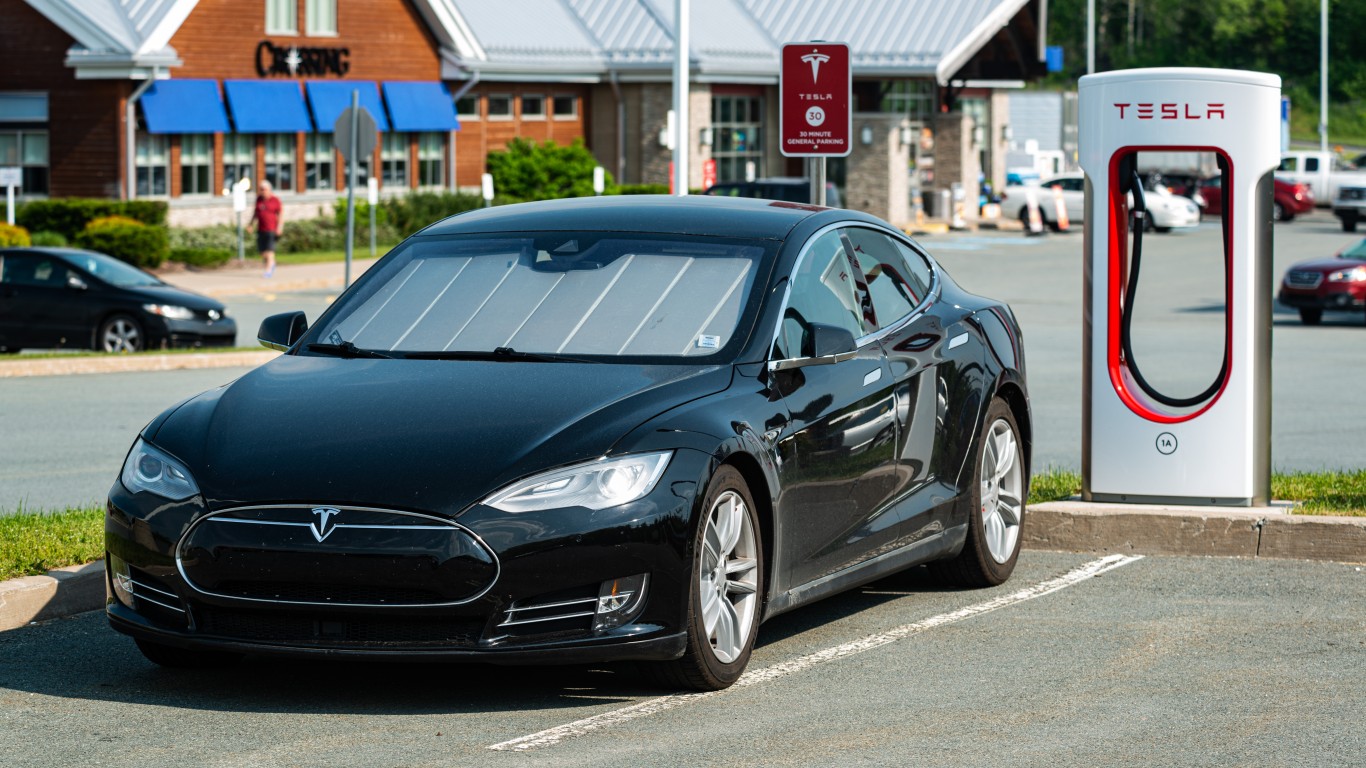
- Automaker: Tesla
- 2023 U.S. sales (first nine months): 13,238
- Share of total U.S. EV sales: 1.5%
- Net change from same period last year: -43.6%
9. R1S

- Automaker: Rivian
- 2023 U.S. sales (first nine months): 14,374
- Share of total U.S. EV sales: 1.6%
- Net change from same period last year: n/a
8. i4
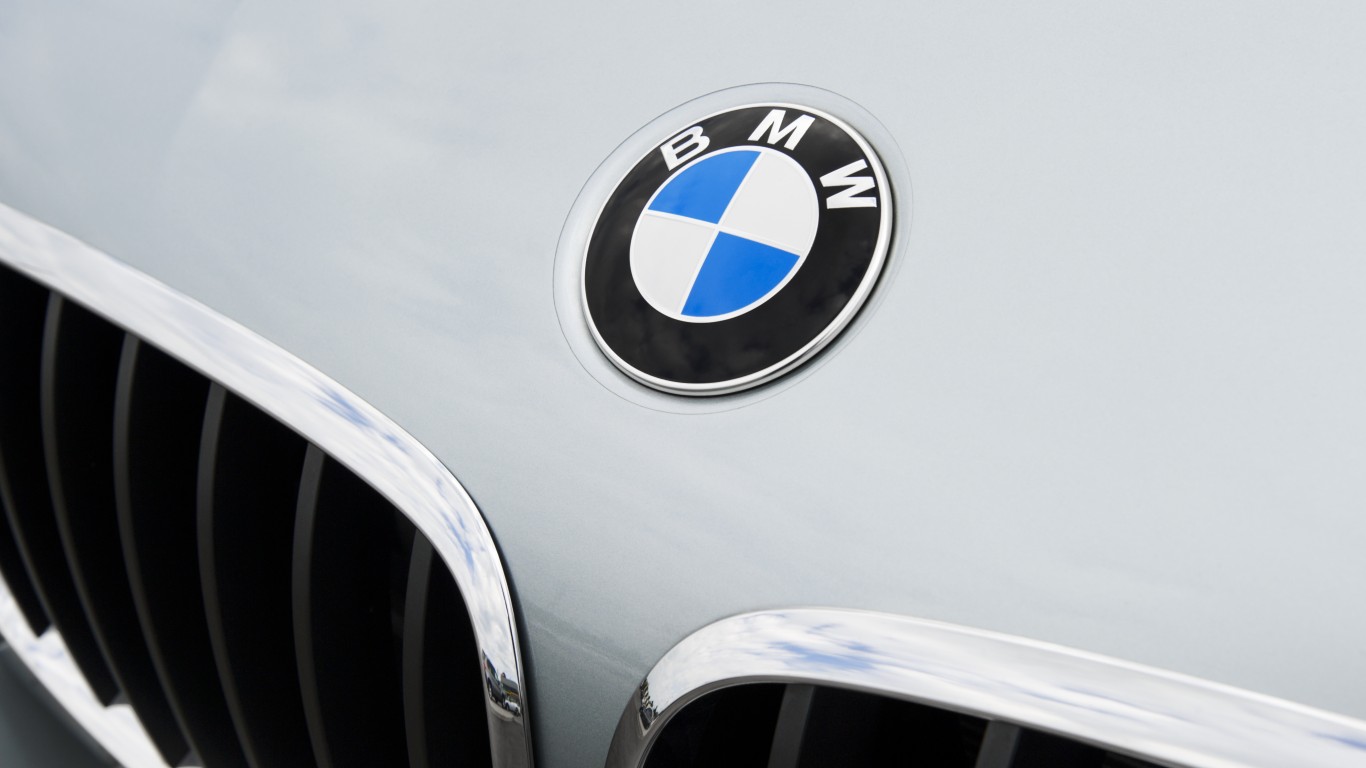
- Automaker: BMW
- 2023 U.S. sales (first nine months): 17,181
- Share of total U.S. EV sales: 2.0%
- Net change from same period last year: 222.9%
7. Model X
- Automaker: Tesla
- 2023 U.S. sales (first nine months): 18,174
- Share of total U.S. EV sales: 2.1%
- Net change from same period last year: -7.0%
6. Ioniq5
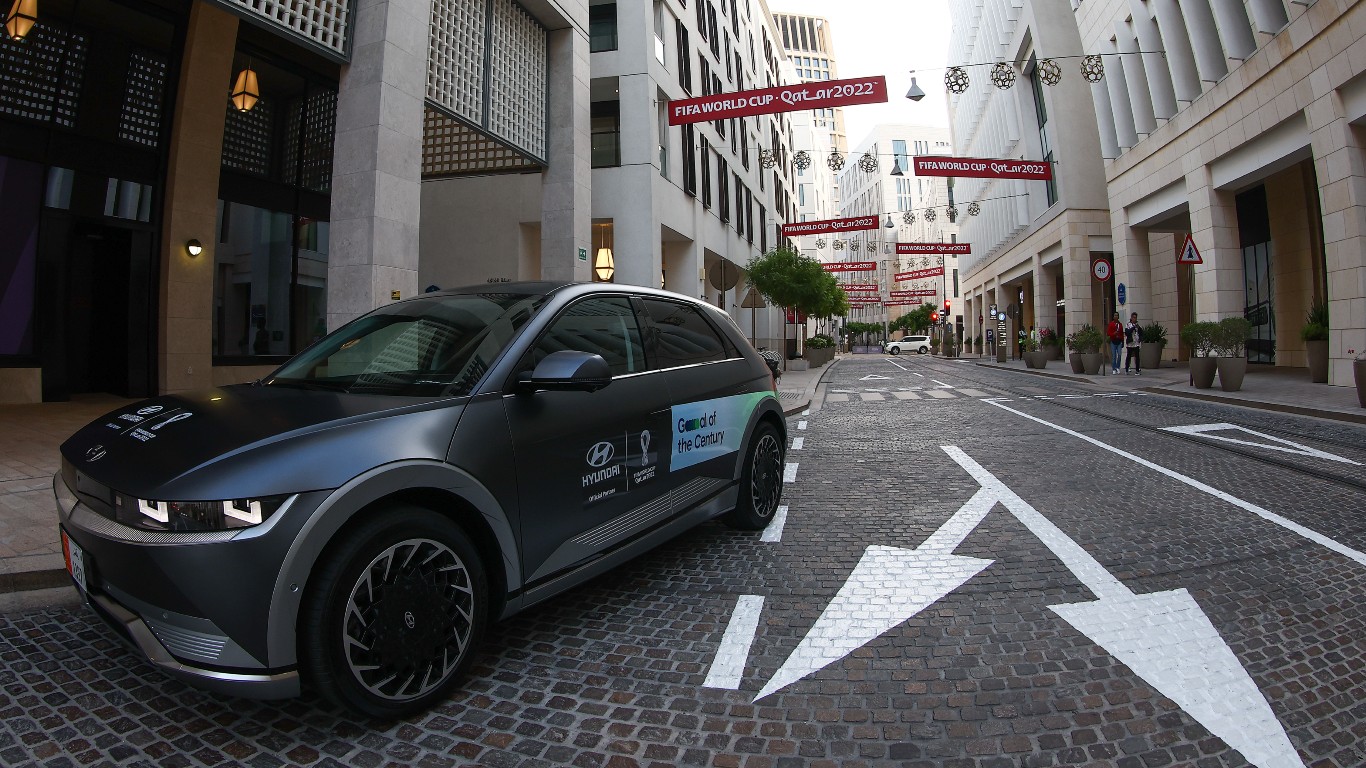
- Automaker: Hyundai
- 2023 U.S. sales (first nine months): 25,306
- Share of total U.S. EV sales: 2.9%
- Net change from same period last year: 36.8%
5. ID.4
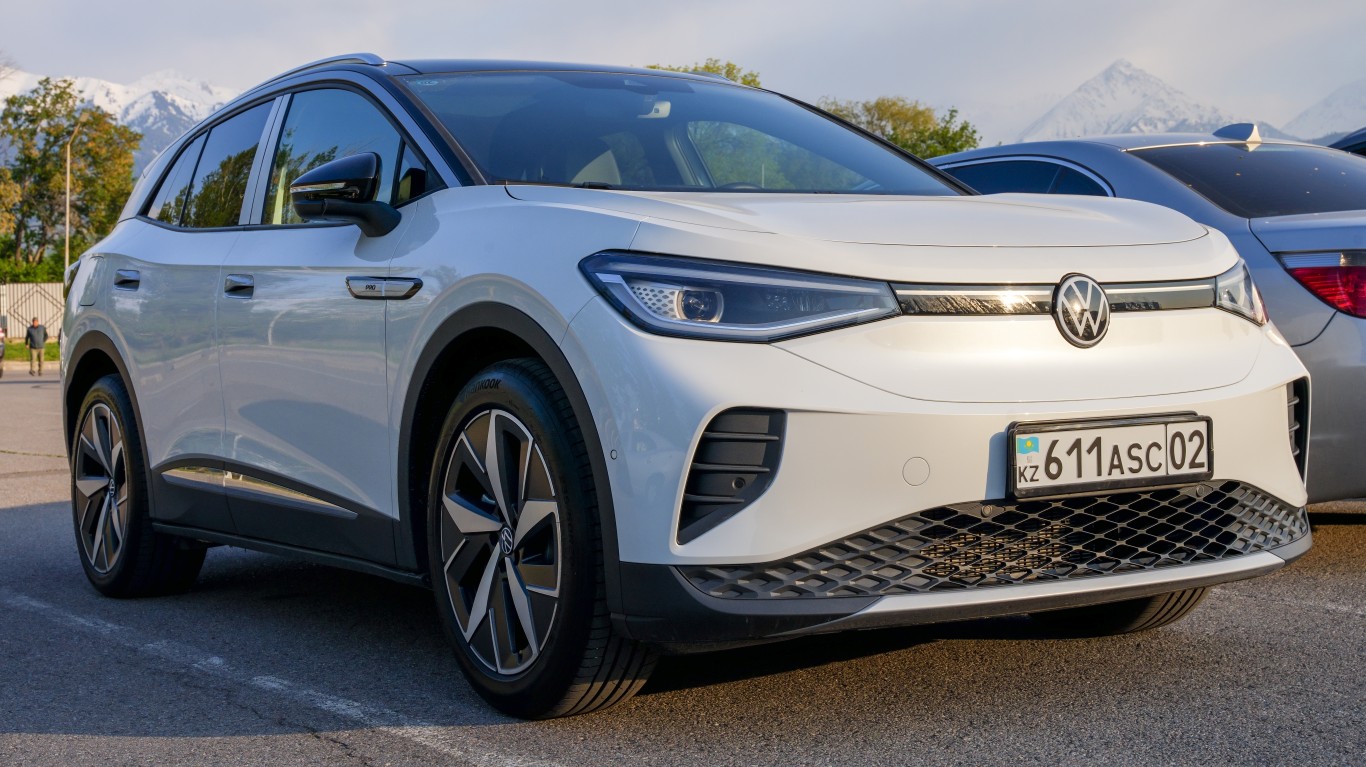
- Automaker: Volkswagen
- 2023 U.S. sales (first nine months): 27,155
- Share of total U.S. EV sales: 3.1%
- Net change from same period last year: 145.3%
4. Mustang Mach-E
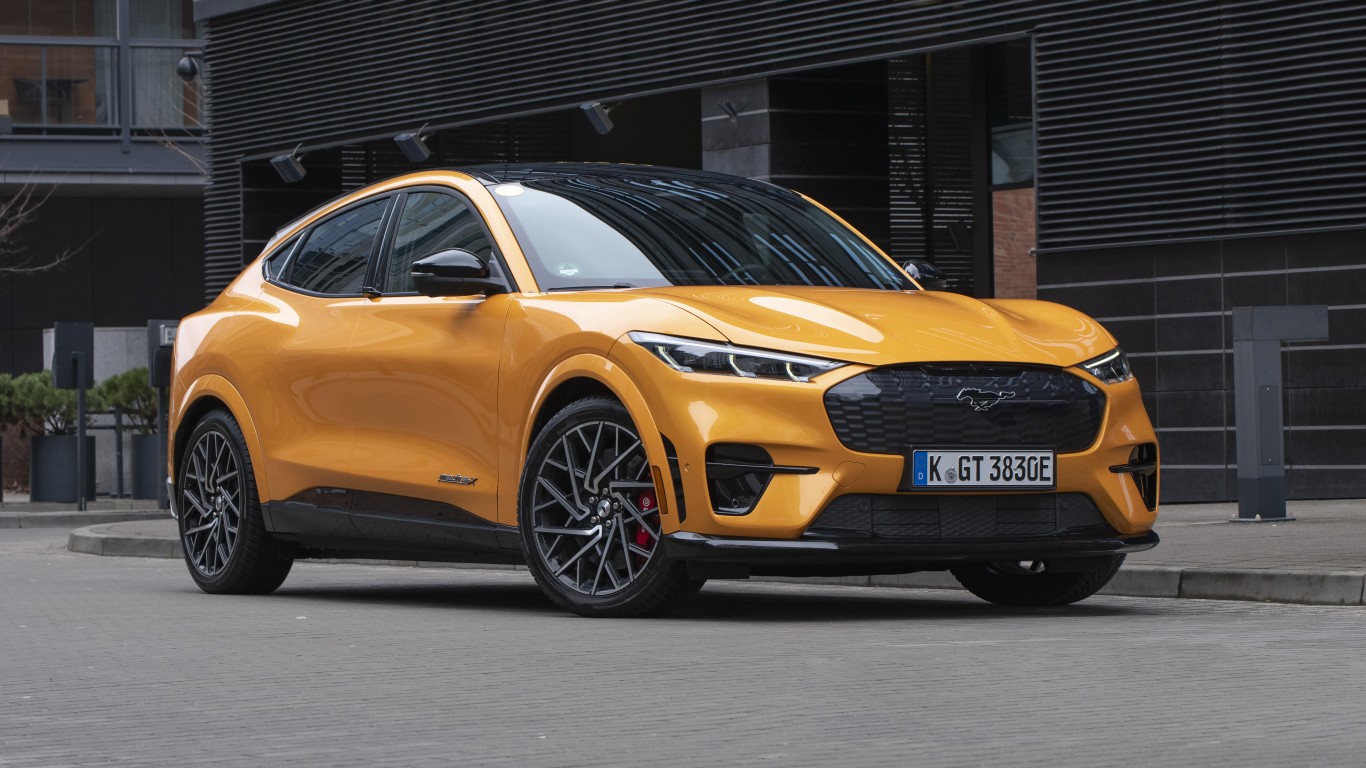
- Automaker: Ford Motor
- 2023 U.S. sales (first nine months): 28,882
- Share of total U.S. EV sales: 3.3%
- Net change from same period last year: 2.8%
3. Chevy Bolt
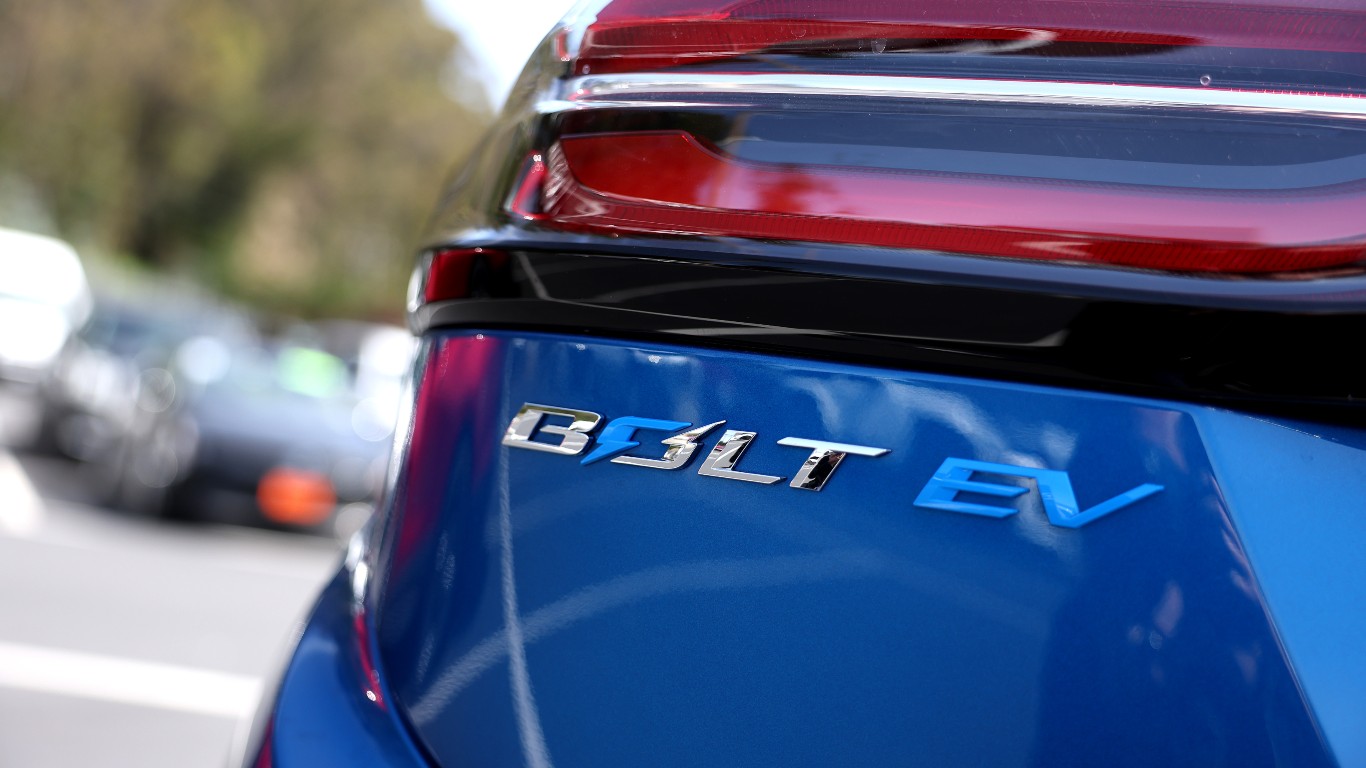
- Automaker: General Motors
- 2023 U.S. sales (first nine months): 49,494
- Share of total U.S. EV sales: 5.7%
- Net change from same period last year: 124.9%
2. Model 3
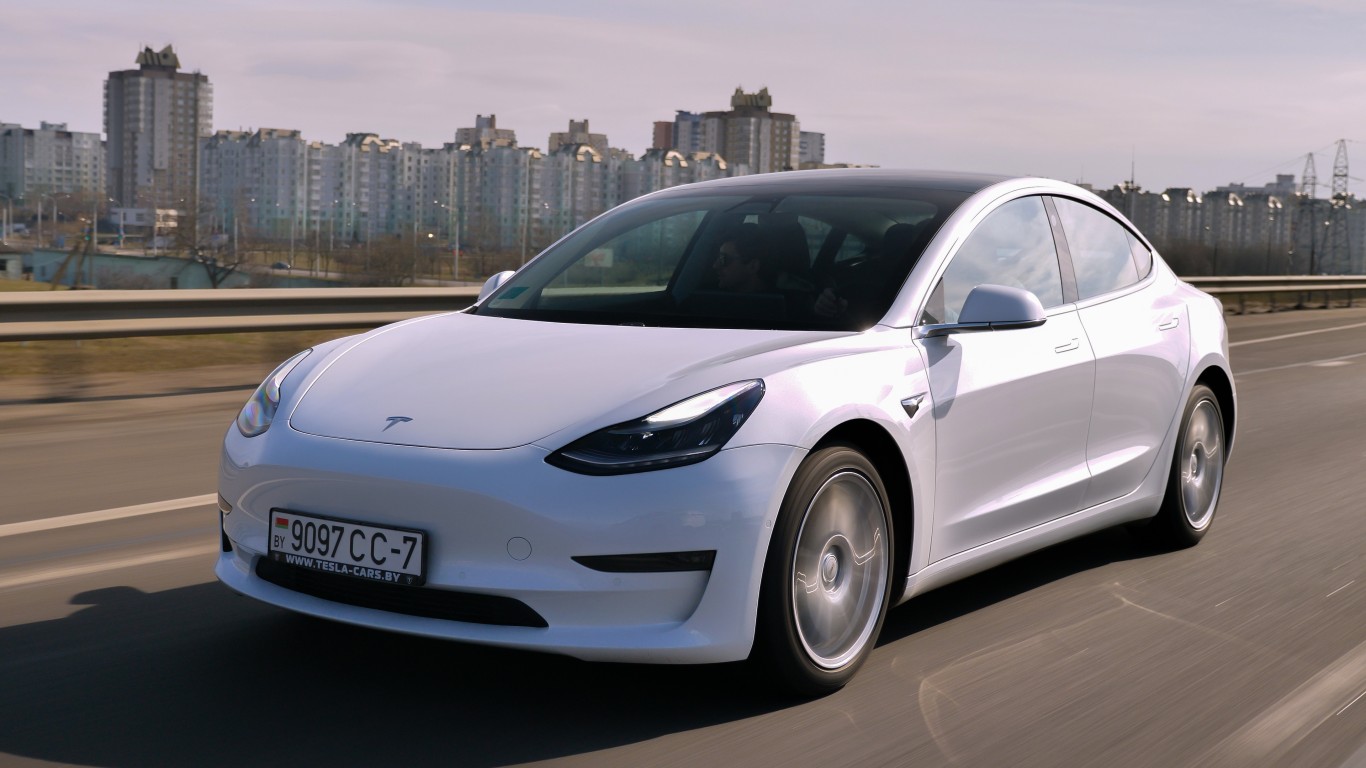
- Automaker: Tesla
- 2023 U.S. sales (first nine months): 166,042
- Share of total U.S. EV sales: 19.0%
- Net change from same period last year: 6.2%
1. Model Y
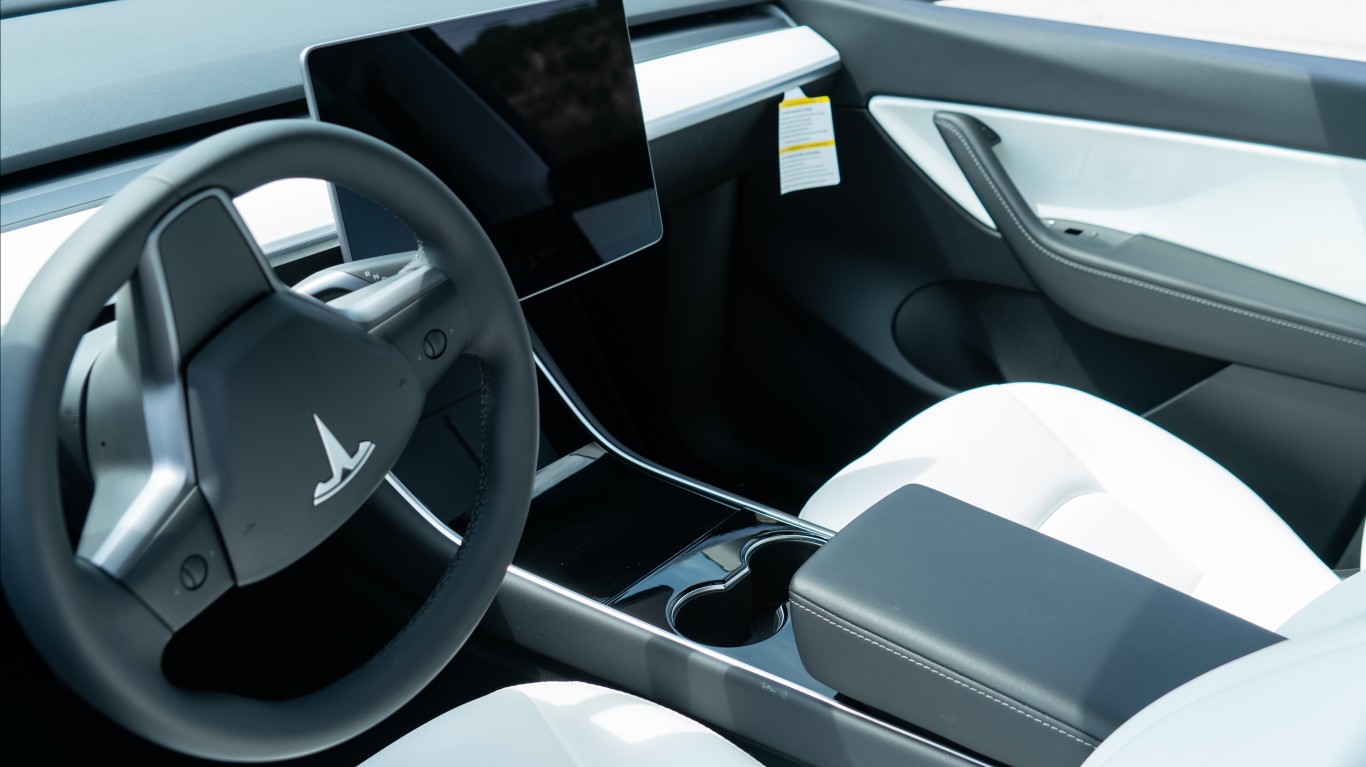
- Automaker: Tesla
- 2023 U.S. sales (first nine months): 296,059
- Share of total U.S. EV sales: 33.9%
- Net change from same period last year: 54.6%
Thank you for reading! Have some feedback for us?
Contact the 24/7 Wall St. editorial team.

